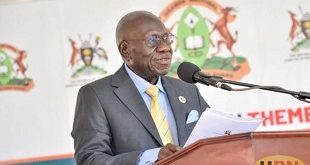
Kampala, Uganda | THE INDEPENDENT | The European Union-EU in Uganda has advised Ugandan citizens to use diverse sources in order to avoid misinformation about Russia’s invasion of Ukraine.
EU Deputy Ambassador Anna Merrifield made the remarks at an event organised by Uganda Radio Network -URN to conclude an 18 months project on Conflict-Sensitive Journalism (CSJ). The project, funded by the EU sought to address the risk of violence before, during and after the January 2021 elections.
“I want to say a few words on the widespread misinformation and growing disinformation,” said Merrifield. “Today, it can be hard sometimes to tell fact from fiction, to distinguish a real story from an intentional effort to deceive, divide and sow discord among the public. We have recently seen the deadly consequences of this in Europe.”
She said the European Union condemns in the strongest possible terms Russia’s unprecedented military aggression against Ukraine and that through the unprovoked and unjustified military actions, Russia is grossly violating international law and undermining European, global security and stability.
Merrifield added that the EU deplores the loss of life and the human suffering.
She added: “I am raising this issue because it is directly linked to the point of disinformation, as well as the war on the ground in Ukraine, Russia is fighting a global information war through social media and government-backed media outlets spreading Russian propaganda. In response, taking unprecedented measures, the EU has sanctioned Russian media outlets Russia Today and Sputnik, meaning they cannot be broadcast in Europe. Twitter and other social media platforms have also removed these channels from their platforms.”
Merrifield said that the Ugandan public should know that this content cannot be relied upon to present a fair and balanced view of what is happening on the ground in Ukraine or elsewhere in the world. She noted that the importance of free and unbiased media cannot be underestimated at a time like this.
Speaking about the URN Conflict-Sensitive Journalism (CSJ) project, the Deputy EU Ambassador said that they recognize that the 2021 election campaign was one of the most violent in Uganda’s history.
“The EU was pleased to be able to support this project as part of our regional work contributing to stability and peace. I would like to recognize the great work that has been done by URN over the past eighteen months to continue its support to independent journalism across all regions of the country, during what has been a very trying time,” Merrifield said in commendation.
She said that the EU condemns the excessive use of force which she said led to at least 54 people being killed on 18th and 19th November, 2020 and called on government to ensure accountability for the victims.
Merrifield also noted that much of the project has been implemented during the suspension of the Democratic Governance Facility-DGF, the single biggest donor basket established by development partners to provide harmonized, coherent and well-coordinated support to state and non-state entities in the country.
She regretted the prolonged suspension of the DGF and that the EU Ambassadors involved in the facility have worked extremely hard through negotiations with many government interlocutors over many months to try and resolve the issue.
Mathias Mulumba, the Projects Coordinator URN said that the Conflict Sensitive Journalism Project had over 200 public service announcements produced and broadcast to promote peace and tolerance during the election period.
He also said that 304 journalists were trained in the conflict-sensitive journalism approach (CSJ) and 12,600 stories were published.
The EU Deputy Ambassador said that they are encouraged to hear from URN that editors and journalists have continued to employ the CSJ approach even a year after the elections.
Merrifield said that despite the good progress made by the project, there is need for further training and refresher courses to ensure the CSJ approach becomes routine.
David Ouma Balikowa, the URN Board Chairman said that the project was mainly intended to try and resolve conflicts that could lead to violence. He encouraged state actors to strive and have a peaceful existence with politicians, journalists and citizens in general.
Charles Twine, the Criminal Investigations Directorate-CID Spokesperson said that the Uganda Police acknowledges that it has done some mistakes and that errant police officers have been punished and some dismissed.
He noted that the Uganda Police is considering future joint trainings to solve some of the challenges experienced during operations.
Twine’s comments followed statements from different political party representatives, civil society activists and journalists about the brutality of the security forces during the election period.
*****
URN
 The Independent Uganda: You get the Truth we Pay the Price
The Independent Uganda: You get the Truth we Pay the Price



The Deputy EU Ambassador should be told that by Europe and US and their proxies freezing twitter and Facebook over Russia, it leaves the world with only one side of the story and the act is not only an abuse of rights and freedoms of Russians but is also a cowardly act. How are Ugandans supposed to know the truth about the war in Ukraine when they can not hear from the other side?
The 2nd issue I would like to ask the EU Ambassador is: There has been many wars in the recent past, most of which have had EU and US as key sponsors. The wars in Libya, Syria, Iraq, Yemen, Somalia, Afghanistan, etc. These wars have generated millions of refugees. But EU has not shown to them an open door policy as is the save with Ukrainian refugees. Why? Is it because the former are Muslims, and the latter are Jewish? Does she see this as right?? I hate hypocrisy.